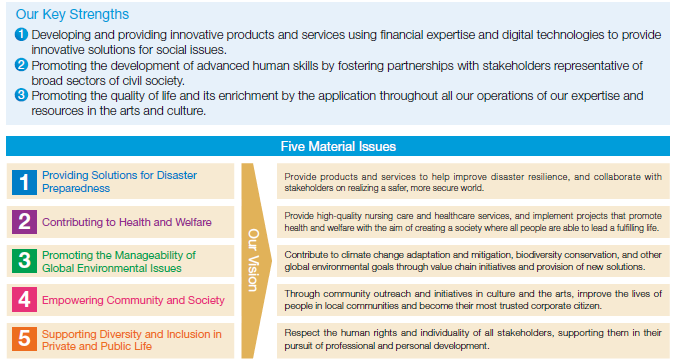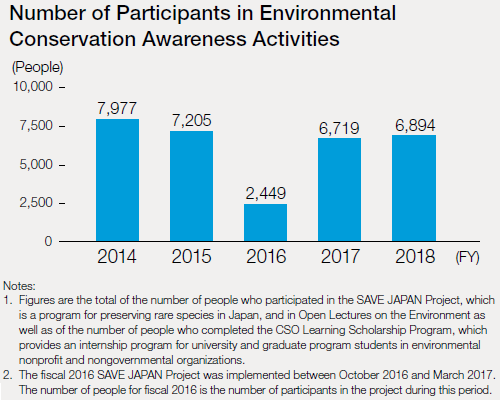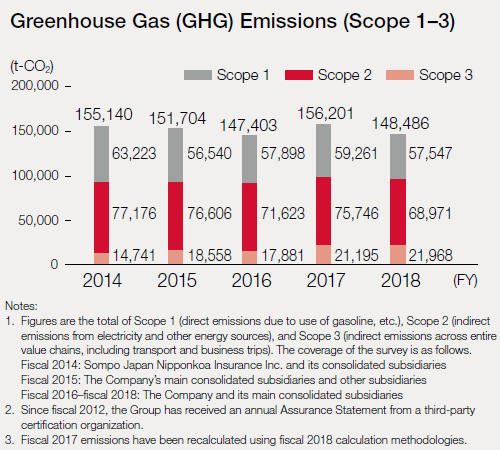The Group CSR Vision calls on us to contribute to security, health, and wellbeing by providing insurance and related services of the highest quality possible. Moreover, the goals of these efforts are to address social issues and help realize a sustainable society. In accordance with this vision, we are advancing a range of initiatives.
Group CSR Vision
We, the Sompo Holdings Group, will positively engage our stakeholders in forward-looking dialogue, respect international standards and codes of conduct, and address environmental issues of climate change, biodiversity, and social issues of human rights and diversity in the course of our business operations in a transparent, fair, and open manner.
By constantly maintaining a long-term outlook, and by providing services and products that contribute to security, health, and wellbeing, we will strive as a solution provider to promote the realization of a resilient and sustainable society.
Based on the Group CSR Vision, we established the following Three Key Strengths to advance its CSR initiatives. Furthermore, the Group identified the Five CSR Material Issues that it should tackle.

Toward the Realization of a Sustainable Society
Climate Change Initiatives
With the adoption of the Paris Agreement and the establishment of the Sustainable Development Goals (SDGs) in 2015, there are growing expectations for corporate action on climate change. In response, we declared our support for the recommendations of the Task Force on Climate-related Financial Disclosures (TCFD). Under this initiative, we are carrying out various measures to address climate change and promoting highly transparent information disclosure, in order to fulfill our responsibility to bestow a hopeful future upon the generations to come.
Main Initiatives in Response to Climate Change Risks and Opportunities
Governance and Risk Management
The Company has risk management systems based on the Group Basic Policy on ERM, established by the Board of Directors.
Under these systems, risks that could have a major effect on the Group are defined as “material risks.” After comprehensively identifying and assessing the risks inherent in our businesses, we regularly report on the status of risk management to the Board of Directors. With respect to climate change, we regard the occurrence of unexpected natural disasters as well as reputational damage associated with the transition to a decarbonized society as material risks in the environmental, social, and governance (ESG) area. Responsibility for implementing countermeasures for these risks lies with the Group’s executives.
We conduct stress tests for such risks as windstorms. We quantitatively assess the impact of stress scenarios that have a significant impact on management and evaluate the adequacy of capital and the effectiveness of risk mitigation measures. Furthermore, we are currently conducting large-scale analyses that use meteorological and climatic big data on typhoons and heavy rains. This entails quantifying changes in the average trends of disasters as well as quantifying trends in the occurrence of extreme weather events in climates undergoing a temperature increase between 2°C and 4°C. We then incorporate the findings into typhoon and flood assessment models and conduct quantitative analyses of the effect on the insurance business.
Strategies and Main Initiatives
Given the potential impact of climate change on its business strategies, the Group is taking various initiatives focused on climate change.
Climate-Related Risks and Opportunities
- Risks Associated with Increasing Natural Catastrophes
A rise in natural catastrophes due to climate change may lead to an increase in insurance payments, leading to a possible deterioration in underwriting results, which may make it difficult to provide stable insurance.
- Risks and Opportunities Associated with the Transition to a Decarbonized Society
Technological progress or the introduction of stricter laws and regulations aimed at transitioning toward a decarbonized society could result in structural changes to industries. Such an outcome could lead to changes in insurance needs and the impairment of stock value and other investment assets, thereby adversely affecting the Group’s future performance or financial position.
On the other hand, we believe that structural changes to industries will increase business opportunities by creating new insurance needs and markets.
- Expansion of the Risk Consulting Business
We expect that the growing need of companies and local governments to take measures in response to climaterelated risks will expand not only the insurance business but also the risk consulting business.
Main Initiatives
- Enhancement of Natural Catastrophe Risk Models and Analytic Technology
Since 2018, Sompo Risk Management has been participating in the Social Implementation Program on Climate Change Adaptation Technology of the Ministry of Education, Culture, Sports, Science and Technology (SI-CAT). The Group aims to upgrade its natural catastrophe risk models, enhance its analytic technology, and accumulate know-how by utilizing a database that projects the climates that would result from global warming with temperature increases of 2°C and 4°C, conducting research on the consequences such a temperature increase, and collaborating with research institutions.
- The Group’s Council for CSR Promotion
This council discusses environmental, social, and governance issues, including the risk of reputational damage accompanying the transition to a decarbonized society.Chaired by the Group Chief Brand Officer (CBO), the council comprises executives from respective Group companies.
- Disclosure Enhancement
The Group has been a member of the PSI-TCFD Insurer Pilot Group of the United Nations Environment Programme Finance Initiative (UNEP FI) since 2018. We are enhancing disclosure in light of the recommendations of the TCFD.
- Stakeholder Engagement
Aiming to improve its measures that address social issues, the Group exercises leadership by creating opportunities for dialogue with diverse stakeholders—including experts and civil organizations—and by participating in initiatives related to social issues.
We are taking steps to help society become sustainable based on the belief that collaboration and co-creation have a significant impact on issues such as climate change that are being addressed by many different organizations.
- Natural Disaster Damage Prediction
Sompo Japan Nipponkoa Insurance aims to use various types of data related to regional disaster prevention—such as meteorological and building data—in combination with
AI technology to develop a service that enables the accurate prediction and assessment of damage to individual blocks before, during, and after floods, earthquakes, and other natural disasters.
- Weather Index Insurance in Southeast Asia
In Southeast Asia, agriculture is the main industry, but the region’s agriculture is vulnerable to climate change. With a view to reducing the risks associated with agricultural businesses in the region, we have been offering Weather Index Insurance since 2010. This insurance pays fixed insurance claims in the event that measurable weather conditions, such as temperature, wind, and precipitation, satisfy particular previously established requirements. Currently, we provide Weather Index Insurance through AgriSompo, an integrated global underwriting platform for agricultural businesses.
The product has been recognized as meeting the requirement for membership to the Business Call to Action (BCtA) initiative, which is led by the United Nations Development Programme (UNDP), with the aim of promoting the establishment of business models that combine commercial activities and sustainable development.
- Regional Resilience through Insurance for Local Governments
In response to a series of floods caused by heavy rains and typhoons, Sompo Japan Nipponkoa has launched Disaster Prevention/Reduction Insurance, which compensates
local governments for costs arising from evacuation in natural disasters. In this way, we help local governments achieve rapid initial responses and contribute to the peace of mind and safety of local communities.
- Raising Awareness among People Regarding Environmental Issues
The Group is raising interest in and awareness of environmental issues, including climate change, among people, thereby increasing the number of persons capable of exercising autonomy in addressing such issues. In this way, we are ensuring a sustained contribution to the resolution of environmental issues. Also, the Group collaborates with research and government institutions in research on environmental issues and shares findings with the public.

Metrics and Targets
We have established key performance indicators (KPIs) for CSR initiatives to enhance and check their effectiveness. In relation to the environment, we are conducting initiatives based on the following KPIs.
- Development and provision of products and services that contribute to climate change adaptation and mitigation
- Participants in environmental conservation awareness and educational opportunities in collaboration with civil organizations
- CO2 emissions
- Electricity consumption
- Paper use
Further, in fiscal 2018 we set reductions in greenhouse gas (GHG) emissions versus fiscal 2017 levels of 21% by 2030 and 51% by 2050 as medium-to-long-term targets. To these ends, we are taking steps to mitigate climate change.
Moreover, we are implementing these measures with a view to acquiring certification under the Science Based Targets initiative, which promotes reductions in GHG emissions that will enable the realization of the Paris Agreement’s long-term goals.
